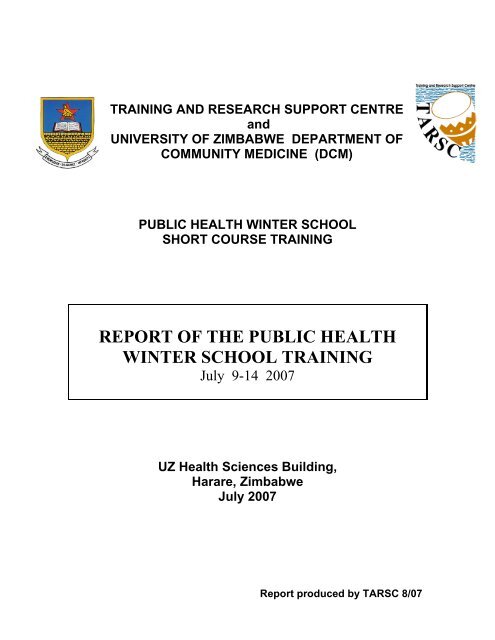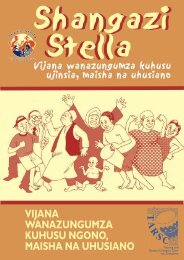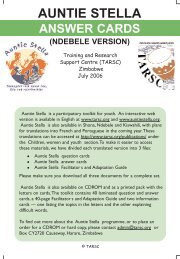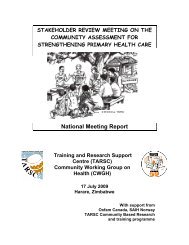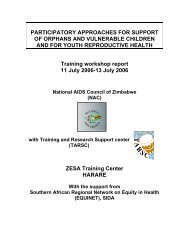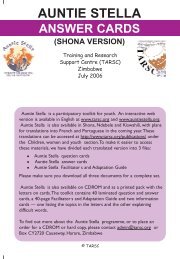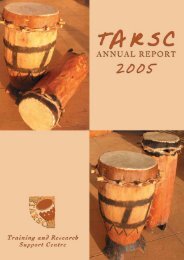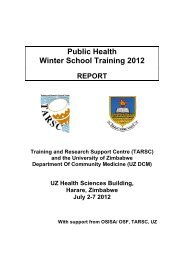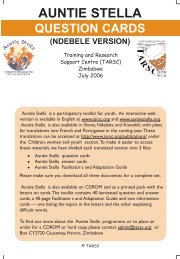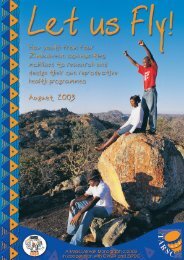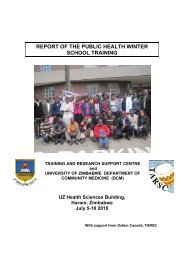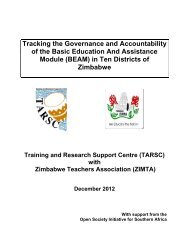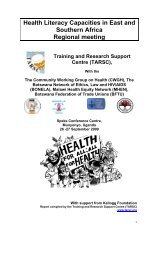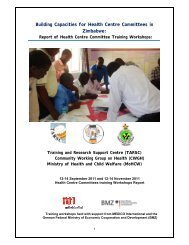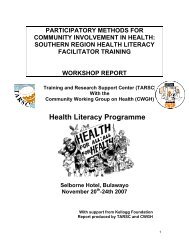WS07 REPORT.pdf - Training and Research Support Centre
WS07 REPORT.pdf - Training and Research Support Centre
WS07 REPORT.pdf - Training and Research Support Centre
You also want an ePaper? Increase the reach of your titles
YUMPU automatically turns print PDFs into web optimized ePapers that Google loves.
TRAINING AND RESEARCH SUPPORT CENTRE<br />
<strong>and</strong><br />
UNIVERSITY OF ZIMBABWE DEPARTMENT OF<br />
COMMUNITY MEDICINE (DCM)<br />
PUBLIC HEALTH WINTER SCHOOL<br />
SHORT COURSE TRAINING<br />
<strong>REPORT</strong> OF THE PUBLIC HEALTH<br />
WINTER SCHOOL TRAINING<br />
July 9-14 2007<br />
UZ Health Sciences Building,<br />
Harare, Zimbabwe<br />
July 2007<br />
Report produced by TARSC 8/07
Table of contents<br />
Executive Summary<br />
1 Background<br />
2. The course<br />
2.1 Introduction to the course<br />
2.2 Introduction to epidemiology <strong>and</strong> public health<br />
2.3 Epidemiology of HIV <strong>and</strong> AIDS: Current situation.<br />
2.4 HIV <strong>and</strong> AIDS Prevention, treatment <strong>and</strong> care.<br />
2.5 Epidemiology <strong>and</strong> management of TB <strong>and</strong> Malaria<br />
2.6 Nutrition <strong>and</strong> food security: issues <strong>and</strong> multisectoral responses<br />
2.7 Assignment one : On Public health<br />
2.8 Zimbabwe’s health services <strong>and</strong> district health systems<br />
2.9 Primary health care policies <strong>and</strong> practice<br />
2.10 Managing <strong>and</strong> retaining health workers at district level<br />
2.11 Essential drug supplies <strong>and</strong> rational drug use<br />
2.12 Health care financing in Zimbabwe<br />
2.13 Financing of HIV <strong>and</strong> AIDS prevention, treatment <strong>and</strong> care<br />
2.14 Mechanisms for community participation in health<br />
2.15 Panel discussion: Non health sector roles in health:<br />
2.16 Assignment two: On Community diagnosis to improve health<br />
2.17 Presentation skills<br />
3. The course evaluation, text <strong>and</strong> closing sessions<br />
3.1 Test of knowledge<br />
3.2 Course evaluation<br />
3.3 Follow up <strong>and</strong> other sources of training<br />
3.4 Course certificates <strong>and</strong> closing remarks<br />
Appendix 1: <strong>Training</strong> programme<br />
Appendix 2 : Student list<br />
1
Executive Summary<br />
The University of Zimbabwe, Department of Community Medicine (UZ-DCM) together with the<br />
<strong>Training</strong> <strong>and</strong> <strong>Research</strong> <strong>Support</strong> <strong>Centre</strong> (TARSC), held for the third year the Public Health<br />
Winter School short course-training programme at UZ Health Sciences Building from the 9 th -<br />
14 th of July 2007.<br />
The structure <strong>and</strong> content of the course was based on the findings from a needs <strong>and</strong> capacity<br />
assessment carried out by the two institutions in 2005 <strong>and</strong> the feedback from the July 2005<br />
<strong>and</strong> July 2006 Winter School courses.<br />
The programme was aimed at building capacities for people working particularly at district<br />
level in health-related work, but who may not have had the benefit of formal training in health.<br />
The course included people from government, education, social welfare, from health related<br />
civil society, from researchers working at community level <strong>and</strong> parliament technical staff<br />
including reporters. The course aimed to build an underst<strong>and</strong>ing of public health <strong>and</strong> of health<br />
systems, particularly at district level. The course covered<br />
• Principles of public health <strong>and</strong> epidemiology<br />
• Major public health issues, including HIV <strong>and</strong> AIDS, TB, Malaria, nutrition<br />
• Elements of health systems, health financing, essential drug supplies <strong>and</strong> human<br />
resources for health<br />
• Zimbabwe’s health services at national, district <strong>and</strong> primary healthy care level<br />
• Community <strong>and</strong> non health sector roles in health<br />
An open invitation was made for applicants <strong>and</strong> of the pool of 50 applicants a total of 29<br />
people were accepted <strong>and</strong> 27 participants attended the course, 20 women <strong>and</strong> 7 men.<br />
Participants included district level officers from various government ministries, non<br />
governmental organisations, civil society <strong>and</strong> research organisations working on HIV <strong>and</strong><br />
AIDS programmes <strong>and</strong> reporters from the parliament of Zimbabwe. Participants came from or<br />
worked in various districts across the country. There were enquiries from foreign students<br />
some from as far as Nigeria but these could not be taken on this year as they all needed<br />
sponsorship.<br />
The resource persons <strong>and</strong> facilitators for the course came from the University of Zimbabwe,<br />
<strong>Training</strong> <strong>and</strong> <strong>Research</strong> <strong>Support</strong> <strong>Centre</strong>, Ministry of Health <strong>and</strong> Child Welfare, National AIDS<br />
Council of Zimbabwe, Food <strong>and</strong> Nutrition Council of Zimbabwe, Non governmental<br />
organisations (CWGH, WAG) Parliament of Zimbabwe <strong>and</strong> City of Harare Health Department.<br />
Sessions were accompanied by h<strong>and</strong>outs <strong>and</strong> course materials. Two assignments were done<br />
by the students in groups to test their public health <strong>and</strong> health systems knowledge. The<br />
second assignment also involved development <strong>and</strong> feedback on a community based project.<br />
This will be followed up on to support community level research skills.<br />
Students completed a course evaluation form at the end of the training to give feedback on<br />
the strengths <strong>and</strong> weaknesses of the training. The evaluation indicated that students found<br />
the course relevant to their work <strong>and</strong> the course useful. Students rated trainers <strong>and</strong> materials<br />
as good. The majority of students understood the lectures, <strong>and</strong> found the h<strong>and</strong>outs <strong>and</strong><br />
assignments clear <strong>and</strong> appreciated the Zimbabwe relevant content. For future courses<br />
students proposed the inclusion of various other topics not covered especially introduction to<br />
research methods <strong>and</strong> grant proposal writing. The course included discussion on further<br />
training opportunities for these areas. Various subjects were also suggested for the proposed<br />
follow up advanced course.<br />
An end of course test was completed with all students passing. The Dean of the School of<br />
Medicine Prof MM Chidzonga gave closing remarks <strong>and</strong> h<strong>and</strong>ed out Certificates of completion<br />
to students marking the end of the Course.<br />
2
1 Background<br />
The University of Zimbabwe, Department of Community Medicine (UZ-DCM) together with the<br />
<strong>Training</strong> <strong>and</strong> <strong>Research</strong> <strong>Support</strong> <strong>Centre</strong> (TARSC), held the third Public Health Winter School short<br />
course-training programme at UZ Health Sciences Building from the 9 th -14 th of July 2007.<br />
The programme is aimed at building capacities for people working particularly at district level in<br />
health-related work, but who may not have had the benefit of formal training in health. The course<br />
thus aims to include people from local government, from health related services <strong>and</strong> sectors<br />
working in areas related to health at district level, from civil society <strong>and</strong> from community leaders<br />
with roles in health.<br />
The course aims to build an underst<strong>and</strong>ing of public health <strong>and</strong> of health systems,<br />
particularly at district level.<br />
The course covered<br />
• Principles of public health <strong>and</strong> epidemiology<br />
• Major public health issues, including HIV <strong>and</strong> AIDS, TB, Malaria, nutrition<br />
• Elements of health systems, health financing <strong>and</strong> human resources for health<br />
• Zimbabwe’s health services at national, district <strong>and</strong> primary health care level<br />
• Community <strong>and</strong> non health sector roles in health<br />
Participants were selected from 50 applicants who responded to an open call, <strong>and</strong> a total<br />
of 27 participants attended the course, 20 women <strong>and</strong> 7 men. Participants included<br />
district level officers from various government ministries, non governmental<br />
organisations, civil <strong>and</strong> research organisations working on HIV <strong>and</strong> AIDS programmes<br />
<strong>and</strong> the committee clerk <strong>and</strong> reporters from parliament of Zimbabwe.<br />
The course involved teaching, presentations <strong>and</strong> mentored assignments. The course<br />
programme is shown in Appendix 1. Students carried out two mentored assignments during the<br />
course to consolidate their knowledge in areas of Public health, <strong>and</strong> Health systems.<br />
H<strong>and</strong>outs were provided for each session in the programme, <strong>and</strong> a list of reference materials <strong>and</strong><br />
useful websites made available for follow up reading on subject areas. An end of course test was<br />
completed <strong>and</strong> certificates of completion were given at the end of the course.<br />
The course was jointly administered by UZ DCM <strong>and</strong> TARSC. Proceedings of the one<br />
week training course are briefly outlined below. A full set of h<strong>and</strong>outs <strong>and</strong> reading<br />
materials is provided with the course. The sessions provided time for questions <strong>and</strong><br />
discussion. These discussions were very lively <strong>and</strong> gave time for delegates to raise<br />
issues arising from their work in the districts. They are not recorded here.<br />
2. The course<br />
2.1 Introduction to the course<br />
The background, course overview, objectives <strong>and</strong> participant introduction was facilitated<br />
by Professor S Rusakaniko UZ-DCM <strong>and</strong> Dr Rene Loewenson TARSC.<br />
3
An Introduction to public health<br />
2.2 Introduction to epidemiology <strong>and</strong> public health<br />
Dr Rene Loewenson TARSC, gave a general introduction to the principles of public<br />
health <strong>and</strong> key concepts in epidemiology <strong>and</strong> how they are used in public health. She<br />
defined public health, <strong>and</strong> outlined using examples from Zimbabwe the basic elements<br />
of public health, the measures <strong>and</strong> concepts in epidemiology, how the data is collected<br />
<strong>and</strong> used <strong>and</strong> how it is applied to address public health.<br />
2.3 Epidemiology of HIV <strong>and</strong> AIDS: Current situation.<br />
Dr A Mahomva (Elizabeth Glazier Pediatric HIV <strong>and</strong> AIDS Foundation ) gave an outline<br />
of the epidemic pattern of HIV <strong>and</strong> AIDS: the transmission mechanisms <strong>and</strong> natural<br />
history of AIDS <strong>and</strong> the trends globally <strong>and</strong> in Zimbabwe of the epidemic. She informed<br />
delegates of the distribution <strong>and</strong> determinants of HIV, <strong>and</strong> the current levels <strong>and</strong> trends<br />
in the HIV <strong>and</strong> AIDS epidemic through prevalence, incidence <strong>and</strong> mortality data. She<br />
used the evidence to describe patterns of vulnerability <strong>and</strong> susceptibility in HIV <strong>and</strong> AIDS<br />
<strong>and</strong> the major public health challenges this raises <strong>and</strong> the opportunities for responses.<br />
2.4 HIV <strong>and</strong> AIDS Prevention, treatment <strong>and</strong> care.<br />
Dr T R Bwakura, a Specialist physician ( Ministry of Health OI Clinic) outlined the options for<br />
prevention, treatment <strong>and</strong> care for HIV <strong>and</strong> AIDS, as well as for opportunistic infections. He also<br />
outlined the current options for Antiretroviral treatment (ART) <strong>and</strong> the issues related to<br />
managing treatment <strong>and</strong> care in Zimbabwe.<br />
2.5 Epidemiology <strong>and</strong> management of TB <strong>and</strong> Malaria<br />
Dr C Duri (Harare City Health Department) outlined the current distribution of<br />
Tuberculosis (TB) in Zimbabwe, its distribution <strong>and</strong> causes. His presentation explored<br />
that TB is, <strong>and</strong> what TB infection is, the major sources of TB infection <strong>and</strong> the<br />
progression from infection to disease. He outlined the current TB trends including the<br />
new XDR strains <strong>and</strong> how TB can be controlled <strong>and</strong> managed, making clear the roles of<br />
communities <strong>and</strong> health services.<br />
On Malaria, Dr J Chirenda UZ DCM provided information on the epidemiology of<br />
malaria, the burden of malaria, <strong>and</strong> its transmission in Africa, Zimbabwe. He discussed<br />
with delegates the burden posed by malaria on health systems, on households <strong>and</strong> local<br />
economies <strong>and</strong> how these can be prevented <strong>and</strong> dealt with. Dr J Chirenda gave a<br />
practical presentation on experiences of managing malaria.<br />
Both sessions outlined <strong>and</strong> discussed the steps to establish a community approach to<br />
TB <strong>and</strong> Malaria management with participants.<br />
2.6 Nutrition <strong>and</strong> food security: issues <strong>and</strong> multisectoral responses<br />
Mr F Makamba University of Zimbabwe department of food science gave a lecture on<br />
nutrition, defining terms <strong>and</strong> outlining the major elements of individual, household, <strong>and</strong><br />
national food needs, how these are met <strong>and</strong> the elements of malnutrition. He outlined<br />
the impact of HIV <strong>and</strong> AIDS on nutrition <strong>and</strong> the nutritional requirements for PLWHA. He<br />
presented the national policies for food security <strong>and</strong> nutrition <strong>and</strong> how the interventions<br />
on nutrition interact with wider health <strong>and</strong> social issues. There was active discussion on<br />
this issue, particularly on issues relating to community level <strong>and</strong> to nutrition issues facing<br />
people living with HIV <strong>and</strong> AIDS.<br />
4
2.7 Mentored assignment one : On Public health<br />
This exercise aimed to use the teaching on public health to test how participants will<br />
apply this knowledge. It took the example of developing an action plan for district level to<br />
use resources to address the most important health problems through approaches<br />
outside the curative health services. Students were put in 5 groups mixing the different<br />
institutions. Each group was asked to prepare an plan for a non curative intervention at<br />
district level to manage a health problem in a district. They worked in groups <strong>and</strong><br />
presented their plans in a plenary for discussion with guidance from Prof S Rusakaniko<br />
<strong>and</strong> Dr Loewenson.<br />
Participants developed assignments on the following areas<br />
Group One presented an intervention to reduce asbestosis among Zvishavane Mine<br />
Employees. The intervention presented aimed to sensitize all managers <strong>and</strong> line<br />
mangers on the effects of asbestosis <strong>and</strong> make respiratory health an organizational<br />
investment priority. The measures included those to equip them the organization with<br />
workplace safety behavior monitoring skills, training of 500 underground mine<br />
employees on Health Education <strong>and</strong> Promotion to raise awareness of asbestosis<br />
through literature <strong>and</strong> visual aides, <strong>and</strong> an evaulation to gauge the effectiveness of the<br />
intervention<br />
Group Two presented an intervention on Malnutrition in Zaka District. It aimed to identify<br />
the why there is a high prevalence of malnutrition in children under five leading to high<br />
mortality <strong>and</strong> morbidity rates. It proposed measures to enlist community <strong>and</strong> partner<br />
participation to enhance nutrition <strong>and</strong> create sustainable food resources.<br />
Group Three presented an intervention on a Diarrhea Outbreak In Epworth District. It<br />
provided measures to create awareness of the problem amongst key stakeholders,<br />
sensitization stakeholders to take social responsibility for the problem, particularly<br />
through school health masters <strong>and</strong> community health workers. It included a plan to<br />
develop safe water sources <strong>and</strong> to promote general <strong>and</strong> personal hygiene, sanitation<br />
<strong>and</strong> waste management. The intervention also included promotion of oral rehiyrdration<br />
solution <strong>and</strong> of food hygiene.<br />
Group 4’s presentation was on Rabies in Mangwe District: The group proposed<br />
measures to eliminate rabid dogs <strong>and</strong> reduce the number of people bitten by dogs in<br />
Mangwe district by 2010 by reducing contact between dogs <strong>and</strong> wildlife animals <strong>and</strong><br />
reducing rabid dogs in the district. Their actions involved fencing of homesteads,<br />
securing game reserve fences, strict enforcement of by laws on poaching <strong>and</strong> building<br />
consensus through advocacy, vaccination of dogs, educating the community on rabies<br />
<strong>and</strong> rabies surveillance.<br />
Group 5 presented an intervention to deal with a cholera outbreak in Kwekwe Amaveni<br />
suburb. They outlined the context of the area in terms of the density of living conditions,<br />
poor waste disposal, overcrowding, bursting of sewage pipes, dumpsites located near<br />
houses, erratic water supplies <strong>and</strong> vegetable <strong>and</strong> fruit markets located where there are<br />
no toilets <strong>and</strong> water toilets. Their actions included dialogue with city fathers on<br />
relocation of dumpsites. repair of burst sewer pipes, regular collection of garbage <strong>and</strong><br />
improved water supplies. They also proposed upgrading the vegetable market st<strong>and</strong>ards<br />
<strong>and</strong> carrying out public awareness campaigns.<br />
The group assignments were reviewed by the students <strong>and</strong> the facilitators <strong>and</strong> feedback<br />
given on each.<br />
5
An Introduction to health systems<br />
2.8 Zimbabwe’s health services <strong>and</strong> district health systems<br />
Mr S Chihanga, Ministry of Health & Child Welfare, talked about Zimbabwe’s health<br />
systems. He outlined the MOH&CW vision <strong>and</strong> mission, the organogram for the<br />
ministries <strong>and</strong> the health care providers in Zimbabwe. His presentation covered the<br />
relationships <strong>and</strong> operational context of the different providers, <strong>and</strong> the roles <strong>and</strong><br />
responsibilities of different levels of the health system. Finally he outlined the<br />
composition of district health executives, including the role of local govt <strong>and</strong> community<br />
level representatives.<br />
2.9 Primary health care policies <strong>and</strong> practice<br />
Mrs J Maradzika UZ-DCM introduced the concepts of Primary Health Care (PHC). She<br />
gave a background to PHC, its attributes <strong>and</strong> components <strong>and</strong> the PHC policies <strong>and</strong><br />
practices in Zimbabwe within the context of the overall National Healthy policy<br />
framework <strong>and</strong> the mission <strong>and</strong> core values of the MOHCW. She gave examples of<br />
different aspects of PHC as practiced in Zimbabwe. She presented the value of these<br />
approaches in addressing the major health problems within districts, using specific<br />
examples.<br />
2.10 Managing <strong>and</strong> retaining health workers at district level<br />
Mr A Mbengwa Zimbabwe Association of Church Hospitals outlined the human<br />
resources policy in the public sector, the challenges faced in relation to health worker<br />
migration, retention, production <strong>and</strong> distribution <strong>and</strong> the strategies used for retention of<br />
staff, including those relating to incentives <strong>and</strong> conditions of service. He outlined other<br />
strategies used by Ministry of Health to deal with health worker losses <strong>and</strong> provide for<br />
health system needs. He commended the establishment of the Primary Care Nurses<br />
through the PCN training programme <strong>and</strong> noted that this had alleviated the staffing<br />
problems at rural health centres.<br />
2.11 Essential drug supplies <strong>and</strong> rational drug use<br />
Ms Simoyi National Pharmaceutical Services gave a lecture on the national essential drugs<br />
programme. She defined essential drugs <strong>and</strong> outlined the advantages of an essential drugs<br />
programme in a country like Zimbabwe, the components of the programme <strong>and</strong> the<br />
elements of drug management, including community roles in rational drug use.<br />
2.13 Health care financing in Zimbabwe<br />
Mr Shepherd Shamu ZEPARU, gave a presentation on health care financing in<br />
Zimbabwe. He described how funds are raised for health across different sources, the<br />
levels of financing <strong>and</strong> how funds are distributed to different providers <strong>and</strong> consumers in<br />
Zimbabwe. He explained how national health accounts are carried out in Zimbabwe <strong>and</strong><br />
what their results show. He discussed the major resource allocation approaches for<br />
health <strong>and</strong> their equity, adequacy, effectiveness <strong>and</strong> efficiency. Mr Shamu outlined how<br />
the current situation relates to national policy goals.<br />
2.12 Financing of HIV <strong>and</strong> AIDS prevention, treatment <strong>and</strong> care<br />
Dr T Magure Executive Director National AIDS Council, in this paper presented on his<br />
behalf by Mr S Chirenje talked about dem<strong>and</strong> for HIV <strong>and</strong> AIDS resources in Zimbabwe,<br />
the global <strong>and</strong> national resourcing of this dem<strong>and</strong> <strong>and</strong> the current sources of funds for<br />
HIV <strong>and</strong> AIDS. This included the Global Fund <strong>and</strong> the National AIDS Trust Fund. He<br />
outlined the level of resources mobilised, the areas these resources are spent on, how<br />
funds are allocated <strong>and</strong> the mechanisms used for this at district <strong>and</strong> community level <strong>and</strong><br />
6
how these should function. He discussed the issues <strong>and</strong> challenges in resourcing the<br />
response to HIV <strong>and</strong> AIDS <strong>and</strong> how these are being met.<br />
2.13 Mechanisms for community participation in health<br />
Ms Linda Mashingaidze <strong>and</strong> Mr Itai Rusike Community Working Group on Health<br />
(CWGH), presented the concepts <strong>and</strong> levels of organization of community <strong>and</strong> of<br />
participation in health, the mechanisms for community participation in PHC <strong>and</strong> district<br />
health systems, including for co-operation within wider intersectoral action for health <strong>and</strong><br />
the issues, <strong>and</strong> challenges faced in implementing such participation. She talked about<br />
the role of civil society, of individuals <strong>and</strong> of households <strong>and</strong> the mechanisms for cooperation<br />
with health service providers <strong>and</strong> within wider intersectoral action for health.<br />
2.14 Panel discussion: Non health sector roles in health:<br />
The panel discussion session was chaired by Dr J Chirenda UZ-DCM <strong>and</strong> papers were<br />
presented <strong>and</strong> discussed by Ms A Mukono, Clerk of the Parliamentary Committee on<br />
Health, Parliament of Zimbabwe on the role of parliament <strong>and</strong> Mrs E Masiiwa, Women’s<br />
Action Group on the role of womens organisations. Their presentations outlined the roles<br />
in intersectoral action for health, how they are linked to the health sector <strong>and</strong> health<br />
services <strong>and</strong> to district level health interventions.<br />
Across all the above sessions students raised questions to presenters <strong>and</strong> issues for<br />
discussion <strong>and</strong> some sessions had very active discussions on issues raised.<br />
2.15 Assignment two: On Community diagnosis to improve health<br />
This exercise aimed to support a local community based exercise that applies the knowledge<br />
learned in the winter school. It used the knowledge learned in the sessions on public health <strong>and</strong><br />
health systems to design a community based research exercise to<br />
• Make a community level diagnosis of a common health problem in the district <strong>and</strong> propose<br />
ways of acting on it, or<br />
• Assess the effectiveness of a health service or intervention in the district <strong>and</strong> propose ways<br />
of improving it, or<br />
• Identify the barriers that specific groups in the community have to access health care <strong>and</strong><br />
identify ways of addressing these.<br />
It aimed to use the information shared in the course to apply to a local context. Students<br />
were asked to work in groups or as individuals. Participants chose to work in groups in<br />
the organizations they had come from with some cross fertilization across groups, as<br />
they wanted to be able to continue after the school to implement the work. The groups<br />
were mentored on their aims <strong>and</strong> methods <strong>and</strong> presented on programmes they designed<br />
for their selected rural <strong>and</strong> urban districts.<br />
The projects identified included the following<br />
The delegates from NAC proposed to assess the challenges preventing children (0-5) in<br />
Marondera Urban from accessing ART <strong>and</strong> within six months come up with<br />
recommendations to resolve the problem. Specifically they presented a programme to<br />
- establish the proportion of children (0-5) attending growths monitoring clinics out<br />
of the total children (0-5) within the catchments area<br />
- establish the number of children in need of ART <strong>and</strong> the proportion of the<br />
children showing clinical signs of HIV referred for treatment<br />
- identify the household factors demographical knowledge <strong>and</strong> social economic<br />
factors affecting use of growth monitoring services assessing uptake of children’s<br />
ART<br />
- increase accessibility to ART services amongst children (0-5).<br />
7
Through this they hoped to improve the quality of life of HIV positive children (0-5) <strong>and</strong> to<br />
reduce infant deaths/illnesses due to AIDS in the area.<br />
A Group working on workplace issues outlined a programme to assess the effectiveness<br />
of condom distribution <strong>and</strong> information dissemination in the prevention of HIV/AIDS in<br />
the workplace at phosphate industrial companies in Harare. They aimed to<br />
- assess the adequacy <strong>and</strong> appropriateness of current interventions ie assessing<br />
whether workers are able to access other preventive services that is VCT, STI<br />
treatment<br />
- find out the attitude of workers on condom distribution <strong>and</strong> use<br />
- determine the knowledge of workers on the mode of transmission, treatment <strong>and</strong><br />
care, prevention of HIV<br />
- make recommendations to improve the HIV/AIDS programmes<br />
- find out other available preventive interventions like STI treatment <strong>and</strong> VCT , <strong>and</strong><br />
- identify barriers against the current HIV/AIDS prevention intervention<br />
The delegates from CWGH explored the reasons for diarrhea in Chikwaka area<br />
(Goromonzi) . Their programme sought to find out the hygiene practices of children<br />
under the ages of 3-16 years old in Chikwaka area in Goromonzi district, particularly<br />
their h<strong>and</strong> washing practices before eating food <strong>and</strong> after visiting the toilet. The<br />
programme sought to find out the environmental factors affecting this, including the<br />
hygiene enabling facilities in the children’s houses <strong>and</strong> school environment <strong>and</strong> the<br />
safety <strong>and</strong> quality of water supplies as well as the children’s knowledge <strong>and</strong> attitudes<br />
towards food hygiene, h<strong>and</strong> washing, use of safe water <strong>and</strong> sanitation.<br />
The group of students from UZ-UCSF aimed to identify the barriers that men <strong>and</strong> women<br />
aged 24 to 45 years living with HIV <strong>and</strong> AIDS have in accessing Anti-Retroviral Therapy<br />
(ART) in Chitungwiza District <strong>and</strong> to explore how to overcome these barriers.<br />
They presented work to find out the social, cultural, political, <strong>and</strong> economic factors<br />
hindering the accessibility of ART to men <strong>and</strong> women aged between 20 – 45 years <strong>and</strong><br />
to find out if there are any myths <strong>and</strong> misconceptions associated with ART.<br />
The discussions on the assignments reviewed the presentations through group <strong>and</strong><br />
facilitator feedback from Dr Loewenson. Follow up steps were agreed on to further<br />
develop <strong>and</strong> submit proposals for delegates to be included in follow up research training<br />
<strong>and</strong> mentoring for their projects. Delegates were asked to submit a concept note with<br />
information on the<br />
- Title<br />
- Names, institution <strong>and</strong> addresses<br />
- The problem statement <strong>and</strong> justification<br />
- The general <strong>and</strong> specific objectives<br />
- The methods, including how authorities / ethical permission will be obtained for<br />
the work<br />
- The resources needed.<br />
Projects included would be mentored as part of follow up field training to further develop<br />
skills <strong>and</strong> linked to research, ethics, <strong>and</strong> reporting training from UZ DCM <strong>and</strong> TARSC.<br />
2.16 Presentation skills<br />
Ms Barbra Kaim TARSC, facilitated on presentation skills <strong>and</strong> key points for preparing<br />
<strong>and</strong> delivering presentations <strong>and</strong> for using visual aids. Participants responded positively<br />
to the session <strong>and</strong> requested that in the next course it be scheduled before students give<br />
their assignment presentations.<br />
8
3. The course evaluation, text <strong>and</strong> closing sessions<br />
3.3 Test of knowledge<br />
Participants completed a test designed to assess the levels of knowledge gained on<br />
content raised in the lecture sessions. The test also aimed to assess the extent to which<br />
materials were understood by students. All students passed the test, the majority<br />
performing well.<br />
3.2 Course evaluation<br />
Participants completed a course evaluation form at the end of training. A total of 22 of<br />
the 27 participants completed the evaluation forms. This was designed to collect<br />
feedback on the strengths <strong>and</strong> weaknesses of the training programme for future<br />
planning.<br />
All of those completing the evaluation,<br />
- All (100% ) found the course relevant to their work<br />
- Three quarters (77%) noted that the course is very useful<br />
- About two thirds (68%) reported that the trainers were good <strong>and</strong><br />
- Over half (55%) rated the course materials as good <strong>and</strong> a further 41% reported<br />
that the materials were very good. Delegates were keen that materials be<br />
updated yearly in each course.<br />
Generally lectures were understood, with some gaps in underst<strong>and</strong>ing (See Table 1).<br />
Some sessions were less well understood than others. Sessions that were less well<br />
understood included<br />
- Nutrition <strong>and</strong> food security<br />
- Zimbabwe’s health services<br />
- Human resources for health<br />
- Health care financing<br />
- Financing of HIV <strong>and</strong> AIDS<br />
In the discussion that was held with the participants it was noted that more time was<br />
needed for some sessions.<br />
On average sessions were rated as relevant <strong>and</strong> useful <strong>and</strong> h<strong>and</strong> outs as clear <strong>and</strong><br />
useful (See Tables 2 <strong>and</strong> 3). Sessions rated as most useful were<br />
- Introduction to epidemiology<br />
- Epidemiology of AIDS<br />
- Management of AIDS<br />
- Epidemiology of TB <strong>and</strong> malaria<br />
Improvements were called for in the h<strong>and</strong>out on Nutrition <strong>and</strong> food security for the future<br />
course.<br />
9
Table 1: Distribution of responses on underst<strong>and</strong>ing of sessions<br />
% Students response on underst<strong>and</strong>ing of<br />
Area of training<br />
sessions<br />
Understood Did not<br />
Understood all most of it underst<strong>and</strong><br />
Introduction to epidemiology 68 32 0<br />
Epidemiology of AIDS 68 32 0<br />
Management of AIDS 68 32 0<br />
Epidemiology of TB <strong>and</strong> malaria 50 41 9<br />
Management of TB <strong>and</strong> malaria at district level 50 50 0<br />
Nutrition <strong>and</strong> food security 24 41 35<br />
Zimbabwes health services 41 50 9<br />
Primary health care & district health 50 50 0<br />
Managing, retaining <strong>and</strong> organizing human<br />
0<br />
resources for health at district level (*) 23 50<br />
Essential drug supplies (*) 50 50 0<br />
Health care financing (*) 18 77 0<br />
Financing of HIV <strong>and</strong> AIDS 32 59 9<br />
Community participation 50 50 0<br />
Panel on non health sector roles on health 50 50 0<br />
(*) Non-response make up the balance<br />
Table 2: Responses on relevance <strong>and</strong> usefulness of course sessions<br />
% Students response on relevance<br />
Area of training<br />
<strong>and</strong> usefulness of session<br />
Relevant<br />
<strong>and</strong> useful<br />
Somewhat<br />
useful<br />
Not useful or<br />
relevant<br />
Introduction to epidemiology 86 14 0<br />
Epidemiology of AIDS 95 5 0<br />
Management of AIDS 95 5 0<br />
Epidemiology of TB <strong>and</strong> malaria 82 18 0<br />
Management of TB <strong>and</strong> malaria at district level 64 36 0<br />
Nutrition <strong>and</strong> food security 45 50 5<br />
Zimbabwes health services 55 45 0<br />
Primary health care & district health 68 32 0<br />
Human resources for health 50 50 0<br />
Essential drug supplies 77 23 0<br />
Health care financing 77 23 0<br />
Financing of HIV <strong>and</strong> AIDS 68 32 0<br />
Community participation 77 23 0<br />
Panel on non health sector roles on health 50 45 5<br />
10
Table 3: Responses on clarity <strong>and</strong> usefulness of h<strong>and</strong>outs<br />
Area of training<br />
% Students response on clarity <strong>and</strong><br />
usefulness of h<strong>and</strong>outs.<br />
Clear <strong>and</strong> Partly clear<br />
useful <strong>and</strong> useful<br />
Not at all clear<br />
<strong>and</strong> useful<br />
Introduction to epidemiology 91 9 0<br />
Epidemiology of AIDS 95 5 4<br />
Management of AIDS 86 14 4<br />
Epidemiology of TB <strong>and</strong> malaria 73 27 0<br />
Management of TB <strong>and</strong> malaria at district level 59 41 4<br />
Nutrition <strong>and</strong> food security 27 73 0<br />
Zimbabwes health services 55 45 0<br />
Primary health care & district health 77 23 0<br />
Human resources for health 68 32 0<br />
Essential drug supplies 86 14 0<br />
Health care financing 59 41 0<br />
Financing of HIV <strong>and</strong> AIDS 64 36 0<br />
Community participation 73 27 0<br />
Panel on non health sector roles on health 59 41 0<br />
Assignments were also generally rated as clear <strong>and</strong> useful, with 82% rating assignment<br />
one on public health in this way <strong>and</strong> a similar 82% giving this rating to assignment two<br />
on community diagnosis.<br />
3.3 Follow up <strong>and</strong> other sources of training<br />
Prof S Rusakaniko <strong>and</strong> Dr Loewenson facilitated a discussion on priorities not covered in<br />
the course <strong>and</strong> further training. Participants suggested that they were keen to get<br />
training in the following areas.<br />
o Laboratory services in public health<br />
o Reproductive health issues, youth rights <strong>and</strong> involvement in public health.<br />
o Introduction to research methods<br />
o Counselling as a contributor to health<br />
o Water <strong>and</strong> sanitation<br />
o Project planning, management <strong>and</strong> monitoring <strong>and</strong> evaluation<br />
o Disease surveillance<br />
o Role of media in public health <strong>and</strong> reporting on public health issues<br />
o Herbal medicines <strong>and</strong> public health<br />
In relation to further training almost all participants indicated an interest in doing a follow<br />
up course. It was agreed that interested students will work on their assignment two<br />
projects <strong>and</strong> develop them further as part of the training, that would also involve two<br />
rounds of research training including field work, report writing <strong>and</strong> reporting back.<br />
3.4 Course certificates <strong>and</strong> closing remarks<br />
It was a moment of jubilation as the Dean of the School of Medicine of the University of<br />
Zimbabwe Prof MM Chidzonga gave the closing remarks <strong>and</strong> h<strong>and</strong>ed over certificates<br />
of completion of the course to the participants. He commended the progamme <strong>and</strong> the<br />
inclusion of participants from diverse backgrounds ranging from rural communities to<br />
national institutions like the parliament of Zimbabwe. Thanks were given to the resource<br />
people, to the course coordinator Mr Thomas Chikumbirike, Course conveners Prof S<br />
Rusakaniko <strong>and</strong> Dr R Loewenson <strong>and</strong> the UZ-DCM <strong>and</strong> TARSC staff for their untiring<br />
efforts <strong>and</strong> collaboration in making the course a success.<br />
11
Appendix 1: <strong>Training</strong> programme<br />
1.1<br />
0800-0900 hrs<br />
1.2<br />
0900-1015 hrs<br />
COURSE TITLE<br />
INTRODUCTION<br />
1015-1045 hrs Tea Break<br />
Registration <strong>and</strong> administration<br />
Monday July 9<br />
• Course overview, objectives, delegate<br />
introduction <strong>and</strong> background<br />
• Outline of course programme,<br />
assignments, practical arrangements<br />
INTRODUCTION TO PUBLIC HEALTH<br />
1.3 1045-1230 Introduction to epidemiology <strong>and</strong> public<br />
health<br />
1230-1330 hrs Lunch<br />
1.4<br />
1330-1500 hrs<br />
1500-1515 hrs Tea break<br />
1.5<br />
1530-1700 hrs<br />
Epidemiology of HIV <strong>and</strong> AIDS: Current<br />
situation.<br />
Prevention <strong>and</strong> treatment of HIV <strong>and</strong><br />
AIDS<br />
FACILITATOR<br />
Thomas Chikumbirike, Zvikie<br />
Mlambo TARSC<br />
Dr R Loewenson, TARSC<br />
Prof Rusakaniko, UZ DCM<br />
Dr R Loewenson TARSC/EQUINET<br />
Dr A Mahomva -Elizabeth Glazier<br />
Pediatric HIV <strong>and</strong> AIDS Foundation<br />
Dr Bwakura -MOHCW OI Clinic ,<br />
Harare Hospital<br />
1.6<br />
0830-0945 hrs<br />
1.7<br />
0945-1100 hrs<br />
1100-1115 hrs Tea Break<br />
1.8<br />
1115-1245 hrs<br />
1245-1400 hrs Lunch<br />
1.9<br />
1400-1700 hrs<br />
Tuesday July 10<br />
Epidemiology <strong>and</strong> management of TB<br />
at district <strong>and</strong> community level<br />
Epidemiology <strong>and</strong> management of<br />
malaria at district <strong>and</strong> community level<br />
Nutrition <strong>and</strong> food security: issues <strong>and</strong><br />
multisectoral responses<br />
Assignment 1 Introduction <strong>and</strong> student<br />
group work time<br />
Dr C Duri –City Health Dept ,infectious<br />
diseases hospital<br />
Dr J Chirenda - UZ DCM<br />
Mr F Makamba, Food <strong>and</strong> Nutrition<br />
University of Zimbabwe<br />
Prof Rusakaniko UZ DCM,<br />
R Loewenson TARSC<br />
12
1.13<br />
0830-1000 hrs<br />
1000-1015 hrs Tea Break<br />
Thursday July 12<br />
Managing, retaining <strong>and</strong> organising human<br />
resources for health at district level<br />
Mr A Mbengwa ZACH:<br />
1.14 1015-1115 Essential drug supplies <strong>and</strong> rational drug use Ms T Simoyi – NPS Ministry of Health<br />
1.15<br />
1115-1300 hrs<br />
1300-1400 hrs Lunch<br />
Health care financing: resource mobilization,<br />
budgeting <strong>and</strong> resource allocation at district level<br />
Shepherd Shamu ZEPARU<br />
1.16 1400-1500 Financing of HIV <strong>and</strong> AIDS Dr Magure NAC<br />
1500-1515 hrs Tea break<br />
1.17 1515-1700 Mechanisms for community participation in health L Mashingaidze, I Rusike CWGH:<br />
Friday July 13<br />
0830-1000 hrs Review of Case study work/ mentored assignment Dr R Loewenson, TARSC<br />
1000-1030 hrs Tea break <strong>and</strong> admin/ resource files<br />
1.18<br />
Panel discussion: Non health sector roles in<br />
health:<br />
1030-1300 hrs<br />
Parliament,<br />
Women’s affairs<br />
1300-1400 hrs Lunch<br />
Chair :Dr J Chirenda –UZ DCM<br />
Ms A Mukono- Parliament of Zim:<br />
Ms E Masiiwa- WAG:<br />
1.19 1400-1445 Test of knowledge T Chikumbirike , TARSC<br />
1445-1500 hrs Tea break<br />
1.20 1500-1615 Presentation skills: B Kaim, TARSC<br />
CONCLUDING SESSIONS<br />
Saturday July 14<br />
1.21 0830-1000 Course evaluation <strong>and</strong> discussion, Follow up Dr R Loewenson , TARSC<br />
1000-1015 hrs Tea Break<br />
1.22<br />
1015-1130 hrs<br />
1.23<br />
1130-1230hrs<br />
1230 hrs Closing<br />
Wednesday July 11<br />
0830-1000 hrs Report back <strong>and</strong> discussion<br />
Case study work/ mentored assignment<br />
1000-1015 hrs Tea break<br />
DISTRICT HEALTH SYSTEMS<br />
1.10<br />
1015- 1145 hrs<br />
Organization of Zimbabwe’s health services<br />
<strong>and</strong> district health systems<br />
Priorities not covered in the course: further training<br />
needs <strong>and</strong> information sources<br />
Course certificates <strong>and</strong> closing remarks<br />
Prof S Rusakaniko UZ DCM<br />
Mr S Chihanga MOHCW<br />
1.11 1145-1300 Primary health care policies <strong>and</strong> practice Ms J Maradzikwa– UZ DCM:<br />
1300-1400 hrs Lunch<br />
1.12 1400-1700 Assignment 2 Introduction, group work Dr R Loewenson TARSC<br />
1500-1515 hrs Tea break<br />
Prof Rusakaniko UZ DCM<br />
Prof MM Chidzonga<br />
Dean Faculty of Medicine<br />
13
Appendix 2 : Student list<br />
# Name, institution, position in institution, address email address<br />
1 Precious Moyo Study Coordinator UZ-UCSF 15 Philips Avenue<br />
precious@uz-ucsf.co.zw<br />
Belgravia Harare Tel: 704890/ 0912259659<br />
2 Tsungai Matiure Programme Coordinator Health <strong>and</strong> Social Services Unit tsungaimatiure@yahoo.co.uk<br />
Methodist Church in Zimbabwe Box CY 71 Causeway Harare Tel: 04-724069/<br />
721154<br />
3 Sherla Greenl<strong>and</strong> Project Manager ZICHIRE Project 28 Van Praagh Ave sherla@zichire.com<br />
Milton Park Tel: 04- 725166/ 747173<br />
4 .Tamsin Steenbok Project Coordinator ZICHIRE Project<br />
tasmin@zichire.com<br />
28 Van Praagh Ave Milton Park Tel: 04- 725166<br />
5 Marshal Mujoma <strong>Research</strong> Counselor UZ-UCSF 15 Philips Avenue Belgravia munjoma@zol.co.zw<br />
Harare Tel: 704890 Fax: 704897<br />
6 Trace Chipinda Assistant Coordinator UZ-UCSF 15 Philips Avenue Belgravia trace@uz-ucsf.co.zw<br />
Harare Tel: 704890/ 0912646123 Fax: 704897<br />
7 Irene Zuya Nurse Counselor UZ-UCSF 15 Philips Avenue Belgravia Harare irynzee@yahoo.com<br />
Tel: 704890 Fax: 704897<br />
8 Patricia Dhlakama Clinic Manager UZ-UCSF 15 Philips Avenue Belgravia patricia@uz-ucsf.co.zw<br />
Harare Tel: 704890/ 0912285034 Fax: 704897<br />
9 . Lillian Chigada Outreach Worker UZ-UCSF 15 Philips Avenue<br />
chigadal@yahoo.com<br />
Belgravia Harare Tel: 704890/ 0912646128 Fax: 704897<br />
10 Grecenia Ndlovu Clinic Manager UZ-UCSF 15 Philips Avenue<br />
grecenia@uz-ucsf.co.zw<br />
Belgravia Harare Tel: 704890/ 0912283635 Fax: 704897<br />
11 Tariro Mavi CWGH 114 McChlery Avenue, Eastlea, Harare Ph -04—788100/ Tpmavi2000@yahoo.co.uk<br />
12 Edger Mutasa CWGH 114 McChlrey Avenue, Eastlea, Harare Ph -04—788100/<br />
0912313762<br />
13 C M Mukamuri Teacher CWGH 114 McChlrey Avenue, Eastlea, Harare Ph – muchamukamuri@cooltoad.co<br />
055-22770/0912280146<br />
14 Senele Dlomo Programme Officer TARSC 47 Van Praagh Ave, Milton Park senele@tarsc.org<br />
Harare Tel: 04-708835<br />
15 Fortunate Machingura Programme Officer 47 Van Praagh Ave Milton Park fortunate@tarsc.org<br />
Harare Tel: 04-708835<br />
16 Chenai Bridget Chikosha Hansard Reporter Parliament of Zimbabwe Box CY bridget_chikosha@yahoo.com<br />
298 Causeway Harare Tel: 04-700181-9 / 0912612048<br />
17 Lucia Nyawo Committee Clerk Parliament of Zimbabwe Box CY 298 Causeway lucynyawo@yahoo.com<br />
Harare Tel: 04-700181-9 / 0912892769<br />
18 Jessie Kunaka ZPP 13 Barmoral Flat Arcadia Harare Ph: 023817801<br />
19 S Marima CWGH 114 McChlrey Avenue, Eastlea, Harare Ph -04—788100/<br />
0912363824<br />
20 Moses Nyamasoka Programme Officer National AIDS Council Box CY1474 mosesnyamaz@yahoo.co.uk<br />
Causeway Harare Tel: 011513327 Fax: 04791243/ 011513327<br />
21 Sukai Govo Monitoring <strong>and</strong> Evaluation Officer National AIDS Council sgovoh@yahoo.co.uk<br />
Box CY1474 Causeway Harare Tel: 04-708043/ 011868331<br />
22 Agrippa T A Zizhou Programme Office National AIDS Council Box 1286<br />
Marondera Tel: 079-22008/ 0912936452<br />
23 Tambudzayi Godfrey Musabayana National AIDS Council Mashonal<strong>and</strong> West<br />
province P Box 609 CHINHOYI Tele: 067 22741/3/ 0912393446<br />
24 Pascal Masocha Programmes Officer National AIDS Council Box 1507<br />
Masvingo 039-263924 /011443957<br />
25 Sibusisive Marunda National Orphan <strong>and</strong> Vulnerable Children Coordinator<br />
National Aids Council No. 5 Dundry Close Strathaven Harare Tel: 0912947633/<br />
791172<br />
26 Dorothy Ndudzo Zimbabwe Chemical Plastic & Allied Workers Union<br />
Health & Safety Officer Box 4810 , Tel: 04-753103 Harare<br />
27 Francisca Binza Programme Assistant ZAN 154 Samora Machel Ave Harare<br />
Tel: 700832/ 795337/ 0912978103<br />
gtmusabayana@yahoo.com<br />
sochworks@yahoo.co.uk<br />
smarunda@nac.org.zw<br />
NA<br />
fbinza@zan.co.zw /<br />
fbinza2002@yahoo.com<br />
14


